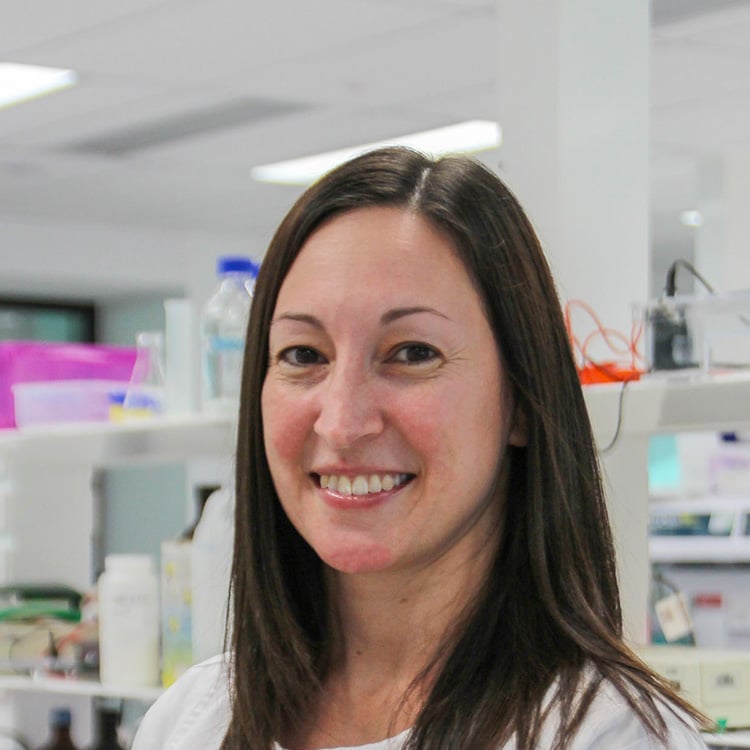
Jacqueline Whitehouse
Senior Postdoctoral Researcher
BSc (Hons), PhD
jacqueline.whitehouse@thekids.org.au
Dr Jacqueline Whitehouse is a post-doctoral researcher in the Brain Tumour Research Program at The Kids Research Institute Australia. She completed a double major in Biomedical Science and Molecular Biology at Murdoch University before undertaking an Honours project in Immunology. She completed her PhD through the University of Western Australia and The Kids Research Institute Australia studying the immunological effects of ultraviolet light on asthmatic responses before changing fields in 2011 to work in paediatric brain cancer research. She was awarded the Elliot Parish Postdoctoral Fellowship for Child Cancer Research in 2015.
In her current role, Jacqueline helped develop a preclinical drug discovery pipeline that led to a clinical trial for children with relapsed/refractory medulloblastoma. Her work focuses on characterising patient-derived models of paediatric brain cancer, which can be used to identify which new treatments will benefit which patients. Complementing her drug discovery work, she has also established preclinical MRI techniques that evaluate the impact of these treatments on developing brains to ensure that only the safest agents are taken forward to clinical trial.
Find Dr Whitehouse on ORCID.
Education and Qualifications
- Doctor of Philosophy with Distinction - The Kids Research Institute Australia and University of Western Australia (2005-2008)
- First Class Honours in Molecular Biology - The Kids Research Institute Australia and Murdoch University (2004)
- Bachelor of Science (Double Major in Biomedical Sciences and Molecular Biology, Minor in Applied Statistics) - Murdoch University (2001-2003)
Awards/Honours
- Robert Connor Dawes Foundation Travel Grant to attend the ZERO Childhood Cancer Symposium in Sydney, October 2022
- Elliot Parish Fellowship for Childhood Cancer Research 2012-2017
- Dr Louisa Alessandri Memorial Fund Award for Excellence and Commitment to Research, August 2014
- Professional Poster Award, Combined Biological Sciences Meeting, August 2013
- Highly Commended for the Dr Louisa Alessandri Memorial Fund Award for Excellence and Commitment to Research, 2013
- Awarded Doctor of Philosophy with Distinction (awarded to top 5% of PhD graduates), December 2008
- Dr Louisa Alessandri Memorial Fund Award for a Highly Commended Scientific Publication, November 2008
- Runner-up for the Telethon Institute for Child Health Research QANTAS Young Investigator Award, November 2007
- Australasian Society for Immunology Travel Award to attend the World Immune Regulation Meeting in Switzerland, November 2007
- Australian Society for Immunology Travel Award to attend the Australasian Society for Immunology conference, November 2007
- Friends of the Institute Travel Bursary to attend the Australasian Society for Immunology conference, November 2007
- Postgraduate Student Association Travel Award to attend the Mutagenesis and Experimental Pathology Society of Australasia conference, October 2007
- Australian Society for Medical Research Travel Award to attend the Australian Health and Medical Research Congress, November 2006
- Pro-Vice Chancellor Award for Research and Innovation awarded at the Australian Society for Medical Research Symposium, June 2006
- Stan and Jean Perron Scholarship (Telethon Institute for Child Health Research), 2005-2008
- Australian Postgraduate Award (University of Western Australia), 2005-2008
- First Class Honours in Molecular Biology (Murdoch University), November 2004
Active Collaborations
Characterisation of novel patient-derived models of paediatric brain cancer
- ZERO Childhood Cancer team at Children’s Cancer Institute, Sydney – Prof Mark Cowley, Prof Paul Ekert, Dr Marie Wong, Ms Chelsea Mayoh, Prof David Ziegler, Dr Maria Tsoli
- Hudson Institute of Medical Research – Dr Christine White
- Perth Children’s Hospital – Dr Sharon Lee
- Royal Perth Hospital – Dr Jason Dyke
- Seattle Children’s Research Institute – Dr Emily Girard
- DKFZ, Germany – Prof Marcel Kool, Dr Aniello Federico
Using MRI to evaluate in the impact of novel treatments on paediatric brain development
- Sir Charles Gairdner Hospital – Dr Martin Ebert
- Centre for Microscopy Characterisation and Analysis – Dr Tim Rosenow
- Lion’s Eye Institute – Dr Andrew Mehnert
Projects
Finding new, safer and targeted therapies for paediatric brain cancer that amplify responses to radiation therapy
Radiation therapy is an essential component of brain cancer treatment. However, the high doses currently required are extremely damaging to the growing brains and bodies of children.
Developing and characterising juvenile models of aggressive paediatric brain cancers for the evaluation of novel immunotherapies.
While profound treatment responses have been realised using immunotherapy for some cancer types, this is yet to be seen for paediatric brain cancer patients.
Published research
In vivo loss of tumorigenicity in a patient-derived orthotopic xenograft mouse model of ependymoma
Ependymomas (EPN) are the third most common malignant brain cancer in children. Treatment strategies for pediatric EPN have remained unchanged over recent decades, with 10-year survival rates stagnating at just 67% for children aged 0-14 years. Moreover, a proportion of patients who survive treatment often suffer long-term neurological side effects as a result of therapy. It is evident that there is a need for safer, more effective treatments for pediatric EPN patients.
